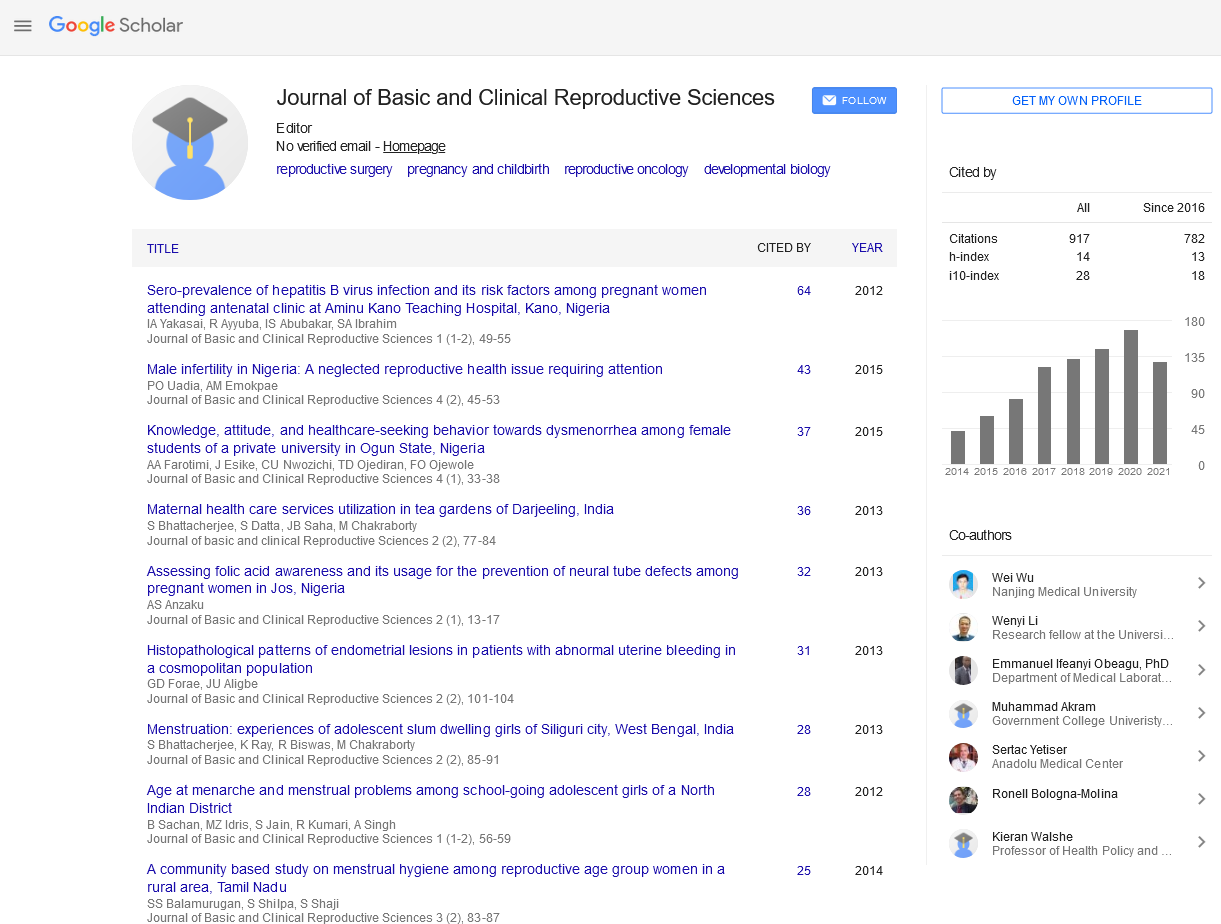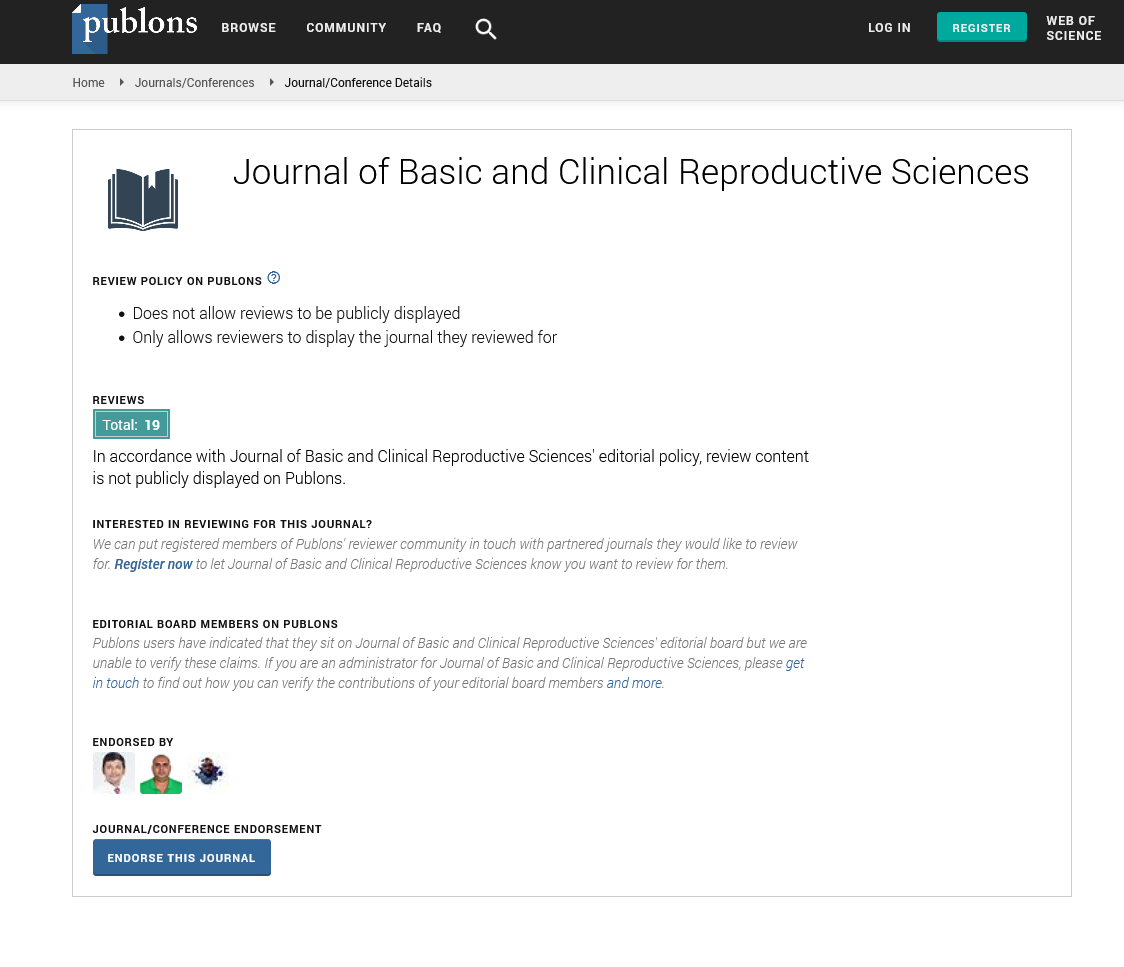Opinion - Journal of Basic and Clinical Reproductive Sciences (2023) Volume 12, Issue 1
Integration of Prenatal Care with Prenatal Diagnostic and Genetic Screen-ing
Received: 08-Jan-2023, Manuscript No. JBCRS-23-92184; Editor assigned: 10-Dec-2023, Pre QC No. JBCRS-23-92184; Accepted Date: Feb 09, 2023 ; Reviewed: 24-Jan-2023 QC No. JBCRS-23-92184; Revised: 02-Feb-2023, Manuscript No. JBCRS-23-92184; Published: 09-Feb-2023
This open-access article is distributed under the terms of the Creative Commons Attribution Non-Commercial License (CC BY-NC) (http://creativecommons.org/licenses/by-nc/4.0/), which permits reuse, distribution and reproduction of the article, provided that the original work is properly cited and the reuse is restricted to noncommercial purposes. For commercial reuse, contact reprints@pulsus.com
Description
Prenatal care is an essential part of maternal healthcare, which includes medical supervision, education, and support for pregnant women throughout their pregnancy. The integration of prenatal care involves the coordination and collaboration of various healthcare providers and services to ensure that pregnant women receive comprehensive care that is tailored to their individual needs. Prenatal diagnostic and genetic screening tests can help identify potential health risks or genetic conditions in the fetus, which can help healthcare providers develop appropriate management and treatment plans.
Pre-test counselling
Pregnant women should receive pre-test counseling to understand the benefits, risks, and limitations of prenatal diagnostic and genetic screening tests. The counseling session should also help women make informed decisions about whether to undergo the tests.
Timely and accurate testing
Prenatal diagnostic and genetic screening tests should be performed in a timely and accurate manner to ensure that healthcare providers have the information they need to provide appropriate care. Results should be communicated to women in a clear and sensitive manner.
Multidisciplinary team
The integration of prenatal care with prenatal diagnostic and genetic screening requires a multidisciplinary team that includes genetic counselors, obstetricians, sonographers, and other healthcare professionals. The team can work together to develop appropriate management and treatment plans based on the results of the tests.
Continuity of care
The integration of prenatal care with prenatal diagnostic and genetic screening requires continuity of care throughout pregnancy and postpartum. Women who receive a positive result on a prenatal diagnostic or genetic screening test may require additional monitoring, treatment, or support during pregnancy and after delivery.
Ethical considerations
Prenatal diagnostic and genetic screening tests raise ethical considerations related to informed consent, confidentiality, and access to care. Healthcare providers should ensure that women have access to appropriate resources and support to make informed decisions about their care.
Multidisciplinary approach
Prenatal care integration requires a multidisciplinary approach involving healthcare professionals from different specialties, such as obstetricians, midwives, nurses, nutritionists, and mental health professionals. This approach ensures that pregnant women receive comprehensive care that addresses their physical, emotional, and social needs.
Continuous care
Integration of prenatal care involves continuous care throughout pregnancy and postpartum. This means that pregnant women receive regular check-ups, screenings, and tests to monitor their health and the health of their unborn baby. Continuity of care also includes the provision of information and education to help women make informed decisions about their health and their baby’s health.
Community involvement
The integration of prenatal care involves engaging the community to promote maternal and child health. Community involvement can include outreach programs, community health fairs, and education campaigns to raise awareness about the importance of prenatal care.
Use of technology
Prenatal care integration can leverage technology to improve access to care and support. Telehealth, mobile apps, and remote monitoring tools can help healthcare providers to connect with pregnant women, monitor their health, and provide timely interventions when needed.
The integration of prenatal care with prenatal diagnostic and genetic screening can help identify potential health risks or genetic conditions in the fetus, which can improve outcomes for both mother and baby. It is essential that healthcare providers provide comprehensive care and support throughout the prenatal period to ensure the best possible outcomes for pregnant women and their unborn babies.


